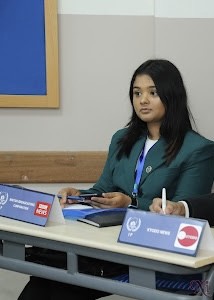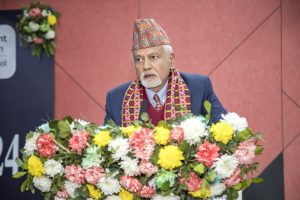-Ms. Nistha Aryal, Kathmandu, Nepal

Begin text.
I’ve always enjoyed participating in Model UNs (Model United Nations), in which Students represent different nations in make-believe meetings of the UN. I had the opportunity to participate in a UNEP committee as a member of the world press for the BBC during my ninth MUN, which was my first at GCIMUN (Global College International Model United Nations).
Given an assignment, I participated in the ensuing conversations, researching international relations and expanding my knowledge of global challenges and etc. I will give a brief overview of the committee’s three days’ worth of activities in this piece.
The opening ceremony kicked off the first day of GCIMUN 2024, providing participants with an overview of the climate change-focused program. After speeches by notable individuals, the committee met for the first time and discussed the items on the agenda. The main agenda item in the UNEP was Ocean Conservation and climate resilience: protecting our blue planet.
Day 1: Tension amid the Summit: China Calls Vanuatu the Least Developed Country, Sparks Discussion.
-The BBC News Reporting.
On February 16, 2023, at precisely 1:40 p.m., the United Nations Environment Programme (UNEP) committee met to begin a crucial day of deliberations. There was an aura of expectation in the room from th
The roll call to the establishing of the agenda. The General Speaker List (GSL) offered a forum for attendees to voice their first thoughts and laid the framework for a full day of discussion.
China’s delegate spoke up passionately, highlighting the nation’s important contributions to ocean protection and marine life. The Chinese delegate addressed China’s policy in detail and did so in a proactive and energetic manner. The committee believed that the USA’s distinctive approach to ocean protection became a focal point for a global conversation. Nations such as Brazil, the UK, Denmark, Germany, and France raised concerns and presented creative solutions for marine conservation.
The delegate from the Solomon Islands brought attention to the problems they face, emphasizing how the over exploitation of their primary resources—fish, land, and timber—has led to their depletion at a high speed. This intervention highlighted the need for nations to work together urgently to establish long-term solutions.
In the meantime, the Vanuatuan representative made a momentous declaration by pledging to help and support other countries in their efforts to safeguard the ocean.
However, China’s envoy stressed Vanuatu’s challenges as the world’s least developed country and cautioned against making unrealistic promises. This stimulating discussion highlighted the disparities and complexities that exist between nations when it comes to addressing global environmental challenges, which gave the discussions a more genuine feel.
Denmark’s delegate made progress by bringing up unresolved issues and convening a moderated discussion on the challenges facing marine conservation. The countries’ eager participation suggested that the UNEP committee meeting at GCIMUN5 was getting underway in a big and exciting way.
Day 2: Nations Ambitious Ocean Treaty: Will Nations Sink or Swim in Implementation?
-BBC NEWS Reporting.

The second day of the United Nations Environment Program (UNEP) committee meeting got underway at nine in the morning with an explosion of activity as the Chinese delegate declared an ambitious Global Action Plan for Ocean Conservation. The strategy sets forth a comprehensive agenda to protect marine ecosystems, with a focus on teamwork as the key to success. In favor of international collaborations, delegates from China, Malaysia, India, South Africa, Turkey, and Japan emphasized the nations’ common responsibility for tackling urgent environmental issues.
The United States contributed to the discussion by emphasizing the significance that innovation and technology have for furthering the cause of ocean conservation. China’s suggestion of creating an unmoderated caucus to draft a working paper turned out to be an important catalyst, steering the committee toward cooperative and innovative concepts.
Denmark advocated for the empowerment and support of indigenous tribes, using a proactive approach. South Africa took a groundbreaking stance in a moderated caucus that was brought up by Denmark, stressing the use of traditional knowledge in international ocean conservation efforts. Delegates strongly endorsed this focus on cultural sensitivity and resilience.
With the signing of the Chengdu. China, Treaty, a ground-breaking accord between China and Denmark, the committee achieved a historic first. With the unanimous approval, the treaty seeks to establish a mutual fund to assist Small Island Developing States, or SIDS, and presents a united front in addressing the problems faced by fragile island states.
All things considered, the UNEP has continuously adopted a nonviolent and cooperative strategy. The dedication to collaboration, creativity, and diversity exhibited on the second day represents a major advancement in the worldwide effort to protect our seas and marine environments. The globe anticipates more advancements in the committee’s efforts to make sure our seas have a sustainable future.
Day 3: The Press Conference.
A press conference was held to speak about the two days of committee discussions at the end of GCIMUN 2024. Climate change was the subject of several committees, each with its own agenda, including UNEP, UNHCR, SOCHUM, UNWOMEN, and ECOSOC. Ten reporters, each allocated to a committee, had prepared questioning for the delegates in detail.
China’s UNEP envoy gave a convincing example of her knowledge of ocean conservation and her dedication to helping developing countries. The investigation centered on China’s approach to striking a balance between economic growth and marine protection. In a different setting, the USA’s large financial contribution to the Chengdu Treaty for Small Island Developing States was carefully examined to determine whether it was in keeping with more general objectives related to marine conservation. The whole UNEP delegation talked about how to deal with possible agenda veering, focusing on ways to stay relevant. This was especially true when it came to the Netherlands delegate’s desire for technology above community empowerment for indigenous people. When it came to suggestions for bolstering international cooperation around global marine conservation, particularly regarding regional ocean data platforms, the Brazilian delegate speaking on behalf of UNEP was questioned. The USA delegation was questioned about how to reconcile human rights commitments at SOCHUM.

Later, in the closing ceremony, Former Ambassador from Nepal to Malaysia, Dr. Niranjan Man Singh Basnyat gave a highly inspirational speech to the delegates. The Chief Guest, a senior Nepali diplomat congratulated the organizers for inviting him to the GCI A Level Model United Nations’ final session. Highlighting challenges related to climate change, the Chief Guest underlined how urgently international cooperation is needed to tackle the deteriorating climate change each year.
Alarming tendencies were found in the climate data, and nations like Nepal were severely impacted. The Chief Guest emphasized the accountability of key contributors to greenhouse gas emissions and called for the strictest adoption of the “polluters pay” principle. The conclusions of COP 28 were deliberated, emphasizing the need for bravery when confronting nations like China and India in international forums. As the Chief Guest’s had spent enough time on duty at Nepal’s Permanent Mission to the UN demonstrated, the significance of economic Development as well as diplomacy were timely emphasized. Recognizing the difficulties in bargaining, the Chief Guest stressed how crucial it is to respect financial agreements made at international conventions to combat climate change. Thanking the audience for their attention, the keynote speech ended.
Thus the conference happily concluded.
End text.
